Businesses, Workers, Teachers Stage Strikes Across Iran
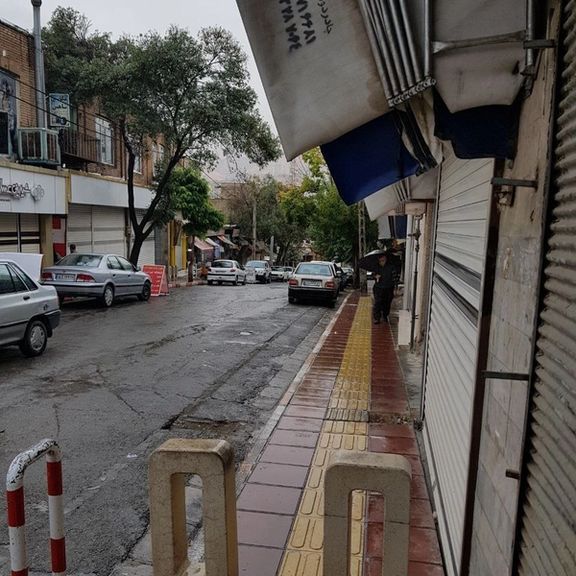
Reports from Iran say several business owners, merchants, and many workers and teachers have gone on strikes across the country on Saturday.

Reports from Iran say several business owners, merchants, and many workers and teachers have gone on strikes across the country on Saturday.
A video obtained by Iran International shows workers at Aidin chocolate factory in Tabriz, northwest of Iran, have gone on strike chanting anti-government slogans in a large demonstration.
As in previous weeks, businesses in the big cities of Kordestan province including Sanandaj, Marivan, Banehand Saqqez also went on strike.
In Bukan, in West Azerbaijan Province people closed their shops to show anger at the brutal crackdown of the Islamic Republic against against protesters.
Nationwide protests schedules for Saturday also got underway around noon, led first by demonstrations in universities.
In another development, The Coordination Council of Iranian Teachers’ Trade Associations called on all teachers and students to refuse to attend classes on October 23 and 24.
The union also asked school principles to participate in the strikes, asking them not to stand against the strikers and resist attacks by the plainclothes agents on students.
During the past days the regime agents have intensified violence against protesting children at schools and arrested teachers and cultural activists.
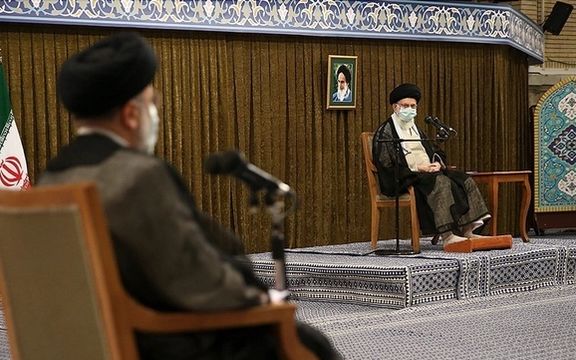
A bill proposed by a US Republican lawmaker, dubbed the Mahsa Amini Act, would impose sanctions on Iran’s Supreme Leader Ali Khamenei and President Ebrahim Raisi.
The bill which would “impose sanctions on the supreme leader of Iran and the president of Iran and their respective offices for human rights abuses and support for terrorism.”
The Mahsa Amini Act, named after the 22-year-old woman who was killed in the custody of Iran’s hijab police, would block the assets of all officials of the Islamic Republic, including Khamenei and Raisi who can be considered the main decision makers in human rights abuses.
Such legislation would have a symbolic impact on the Iranian leaders, but any additional sanctions would mean further isolation for the Islamic Republic and make it harder for the Biden Administration to make a new nuclear deal with Tehran.
“The supreme leader holds ultimate authority over Iran’s judiciary and security apparatus, including the Ministry of Intelligence and Security, law enforcement forces under the Interior Ministry, the Islamic Revolutionary Guard Corps (IRGC), and the Basij, a nationwide volunteer paramilitary group subordinate to the IRGC, all of which have engaged in human rights abuses in Iran,” states the legislation.
The bill further says that “the IRGC, a United States designated Foreign Terrorist Organization, which reports to the supreme leader, continues to perpetrate terrorism around the globe, including attempts to kill and kidnap American citizens on United States soil.”
It also expresses “the sense of Congress that the United States shall stand with and support the people of Iran in their demand for fundamental human rights.”
Congressional sources told the Washington Free Beacon that the bill was presented to the offices of every Democratic member of the House of Representatives, but none of them supported the plan.
Claudia Tenney the Republican lawmaker says Congress must not lose the chance to help protesters by increasing sanctions on the Iranian regime.
“The Iranian regime’s heartless murder of Mahsa Amini once again exposed the reality that Iran’s government abuses and subjugates women,” said Tenney adding that “the brutal crackdown on protesters has shown their disdain for basic human rights and underscores the need for a more permanent sanctions regime against the Iranian government.”
Likewise, Republican Michael Waltz, who is one of the coauthors of the bill, says “We’re nearly two years into the Biden administration and it’s clear their appeasement policy towards Iran isn’t working.”
“The Iran regime continues to export terrorism, repress its people, directly aid Russia in its invasion of Ukraine, and is closer to a nuclear weapon than ever before. We need to stand up for our national security and the people of Iran by reimposing crippling sanctions on the Iran Regime,” underlined Waltz.
The Biden Administration has taken several steps since the protests in Iran began in mid-September. It has issued sanctions against some officials and entities and has signaled that nuclear talks with Iran have been put on the backburner. But its lax enforcement of oil export sanctions since early 2021, has allowed China to import more Iranian crude, which has somewhat boosted the regime’s income.
According to the Oslo-based NGO Iran Human Rights Organization at least 215 people, including 27 children have been killed with excessive and lethal force throughout Iran during the current antigovernment protests.
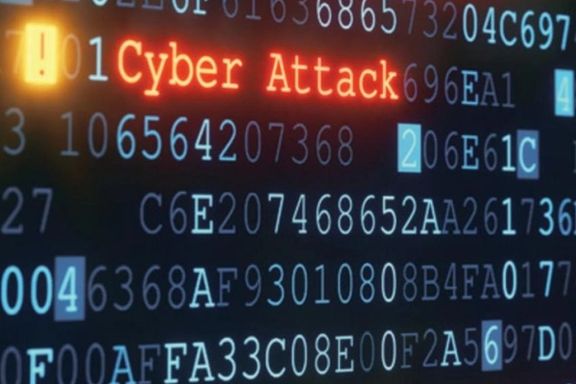
A hacker group says it has obtained documents on the Islamic Republic’s atomic activities and will publish them if the government does not stop clampdown on protesters.
The group calling itself the Black Reward claimed on Friday that the internal email system of Iran's Nuclear Power Production and Development Company was hacked.
Black Reward warned that it will publish the data it has obtained within 24 hours unless the Islamic Republic releases all political prisoners and detained protesters.
There has been no reaction from the government so far.
The hacktivist group said the Islamic Republic’s officials well know what impact the release of these hacked data will have on their “sloppy nuclear program.”
“There's no solution but giving in to the popular demands, which means the end of the Islamic Republic,” said Black Reward.
Earlier in the week, the group also announced that it hacked the emails of managers and employees of Press TV, the government’s international English news channel.
Black Reward asked the journalists of this network to be the “voice of the people” while the Islamic Republic is cracking down the anti-government protests.
Several other hacktivist groups including Anonymous launched cyberattacks on government institutions since the beginning of protests to topple the regime.
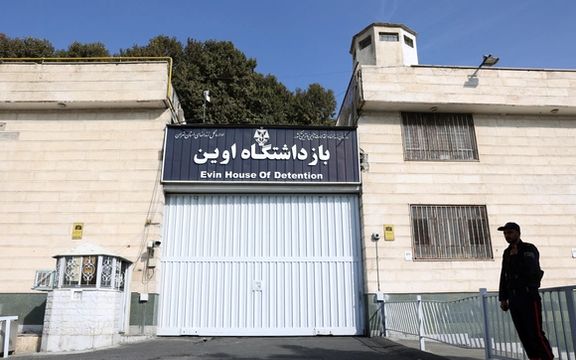
Although print media in Iran are under strict control and rarely publish news about the protests, security forces have arrested more than three dozen journalists.
There is a limited degree of discussion in websites and newspapers about how to deal with the protest movement by pundits who are allowed to speak with the media, but these discussions are also limited to opinions that do not cross the regime’s red lines.
The most important red line they do not cross is stating that Supreme Leader Ali Khamenei controls all major security decisions and actions in Iran. And this is no surprise. If a media outlet calls the Supreme Leader out on any issue, its managers and reporters will be arrested. So, when the reformist Arman-e Melli daily suggests that "It is time to listen rather than to dictate," it needs to address that to Khamenei, but the media are so intimidated by his power that they do not even implicitly refer to him in such a context.
Prominent Iranian photojournalist Hassan Sarbakhshaian, in a series of tweets on 12 October, listed the names of 38 Iranian journalists who have been arrested by security forces between September 16 and October 10. Sarbakhshaian said the list is verified by the Committee for Protection of Journalists.
Since Sarbakhshian's tweet, a few of those arrested have been released and a few more journalists have been detained, so the figure must have remained around 40. This number is alarming enough for other journalists and media managers to thread carefully. In the meantime, some centrist papers whose reporters are already in jail have even changed their slant in favor of regime’s rhetoric at the expense of annoying their readers.
According to Arman-e Melli, some reformist parties have written to President Ebrahim Raisi demanding permission to hold peaceful demonstrations, but Raisi has not responded, and no party, reformist or otherwise, is brave enough to write to the Supreme Leader. He is unreachable, untouchable and unaccountable.
Many observers in Iran have noted that political parties, as shock absorbers that could protect the government from serious street challenges, are non-existent in Iran. At another level, the president could have acted as a safety net between protesters and the Supreme Leader. But Khamenei has made the role of the President irrelevant. As a result, few protesters even mention Raisi’s name and direct all strongly worded and often derogatory slogans at Khamenei.
Not only the 83-year-old ruler has not done anything to make it possible for top officials to engage with and try to pacify the demonstrators, but he has prevented such dialogues. Judiciary Chief Gholamhossein Mohseni Ejei last week called for dialogue with protesters, but in less than a day, Khamenei forced him to change his word and resume the usual non-compromising and threatening rhetoric.
Even on Thursday, some politicians such as Mohammad Ali Namazi renewed the call for national reconciliation, but Khamenei and the hardliner media supporting him shunned the idea.
Arman-e Melli quoted sociologist Taqi Azad Armaki as saying that "the new generation of Iranians are calling on the regime to pay attention to them. Otherwise, they are not 'revolutionaries' as foreign-based media call them. What Armaki ignored is that many media outlets in Iran would have also called them 'revolutionaries' if they were ever allowed to describe the country's situation as it is.
List of detained journalists as of October 12 -

Iran's top Sunni cleric blamed Iran's ruler Ali Khamenei Friday as people took to the streets of the southeastern Iranian city of Zahedan to commemorate those killed in "Bloody Friday" protests three weeks ago.
The Bloody Friday in Zahedan, the provincial capital of Sistan and Baluchestan took place September 30, when security forces killed at least 93 people, and injured hundreds more. Zahedan is one of the few Sunni-majority cities in predominantly Shiite Iran.
Molavi Abdolhamid, the religious leader of Iran’s largely Sunni Baluch population, said that no one can evade responsibility for the carnage, dismissing the Islamic Republic's official account of the events which attributed the Bloody Friday to separatists and militant groups. “They were sheer lies,” Abolhamid said.
"Unity, unity," "Death to Basiji," and "Death to the dictator", the protesters chanted Friday in reference to Supreme Leader Ali Khamenei outside a police station, one of the places where the repression agents opened fire on protesters and bystanders.
Dismissing the scenarios that the Islamic Republic has used to justify its clampdown on the antigovernment protests, trying to portray them as separatist movements, people of Zahedan chanted slogans such as "From Zahedan to Tehran, I sacrifice my life for Iran."
According to reports, IRGC forces and snipers were stationed on the roofs of some buildings in Zahedan in an effort to suppress the popular protests.
Despite threats as well as widespread arrests among striking workers in the oil and gas industry and young protesters on streets, the uprising is raging across the country.
The US-based Iranian Human Rights Activists News Agency (HRANA) reported on Thursday that at least 12,500 people have been detained in Iran, adding that at least 244 people, including 32 children, were also killed.
Reports from Iran also indicate that despite widespread arrests among striking workers in the oil and gas industry and young protesters on streets, the uprising in Iran shows no sign of abating.
On Thursday, the Union of Truck Drivers announced that in support of the protests they began a strike Friday and will stop transportation activities. Loading at some oil, gas and petrochemical plants slowed down.
On October 18, the workers of Haft-Tappeh Sugarcane complex in the southwestern Khuzestan province joined the strikes in oil, gas, and petrochemical sectors in southern Iran.
Workers of several phases of South Pars Gas-Condensate field, Bushehr Petrochemical Company and Hengam Petrochemical Company -- both of which operate at Asalouyeh Complex -- Abadan Petrochemical company and refinery, Mahshahr’s refinery and Pipe Mill Plant, as well as Neyriz Ghadir Steel Complex off the coasts of the Persian Gulf have been on strikes in solidarity with the protests across Iran.
An Iranian teachers' union also called a two-day strike as of Sunday over the lethal targeting of schoolchildren in a crackdown on protests. The Coordination Council of Iranian Teachers’ Trade Associations declared the sit-in strikes for Sunday and Monday, saying, “We teachers will be present at schools but will refrain from being present in classes," it said in a statement posted on its Telegram channel. We know very well that the military and security forces and plainclothesmen have violated schools and educational centers.”
"During this systematic oppression, they have mercilessly taken the lives of a number of students and children; from Nika (Shahkarami) and Sarina (Esmailzadeh), to Abolfazl (Adinezadeh) and Asra Panahi," it said.
"The rulers must know that ... Iran's teachers do not tolerate these atrocities and tyranny and proclaims that we are for the people, and these bullets and pellets you shoot at the people target our lives and souls," it added.
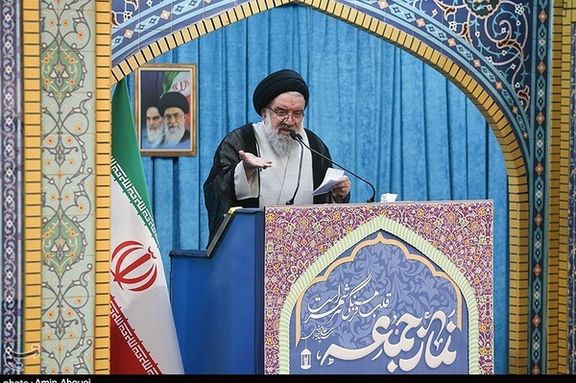
Firebrand Iranian cleric Ahmad Khatami has called on Iran's judiciary to take tougher measures against people attending antigovernment protests, ignited by the death in custody of a 22-year-old woman.
The hardliner cleric, who led the prayers on Friday in capital Tehran, said in his sermon that "The judiciary should deal with the rioters -- who betrayed the nation and poured water into the enemy's watermill -- in such a way that others don't again fancy to riot."
Khatami, who is the interim representative of the Supreme Leader in Tehran and is a member of several government bodies, added that anyone who thinks the country's rulers will fall is dreaming.
Blaming "thugs" linked to "foreign enemies" for the unrest, that has convulsed Iran after the death of Mahsa Amini last month, he said, "They have told deceived kids if they chant in the streets for a week the regime will fall. Dream on! The judiciary should deal with rioters in such a way they would never aspire to riot."
His threats were echoed by other hardliner Friday prayers Imams in various cities. The contents of Friday Prayer sermons delivered by Khamenei's local representatives in various cities are dictated by two state bodies close to Khamenei's office, officially known as "The Policy-making Council for Friday Prayer Imams" and the "Friday Prayer Headquarters," both dominated by hardliner clerics.
Despite threats as well as widespread arrests among striking workers in the oil and gas industry and young protesters on streets, the uprising is raging on across the country.
On Friday, hundreds of demonstrators took to the streets of the southeastern city of Zahedan, three weeks after "Bloody Friday" protests, in which Iranian security forces killed at least 93 people. The protesters chanted "Death to the dictator", referring to Iran’s ruler Ali Khamenei.